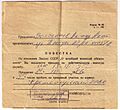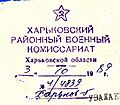Military commissariat facts for kids
A military commissariat, also known as a voyenkomat (from the Russian word for "military commissariat"), is a special office that helps manage military matters in some countries. Think of it as a local military office. In the 1800s, the British Army used similar offices to keep track of supplies, soldiers, and equipment.
The most famous use of military commissariats was in the Soviet Union. Each local area in the Soviet Union had one. These offices were in charge of keeping records about military resources, including people who could serve. They also helped recruit and train new soldiers. After the Soviet Union ended in 1991, Russia continued to use military commissariats.
Sometimes, people have criticized these offices. There have been concerns about fairness in recruitment and claims of a tough military culture. Despite these concerns, military commissariat buildings still serve their purpose in Russia and some other countries that used to be part of the Soviet Union. In France and Italy, the word "commissariat" can also refer to police stations, some of which work with the military.
Contents
Military Offices in the Soviet Union
In the Soviet Union, a military commissariat (called voyenny kommisariat in Russian) was a local office that handled military tasks. These offices were led by a military commissar (or voyenkom). The commissar worked with a local military commander. These short names, voyenkomat and voyenkom, were common in the Soviet Union.
Military commissariats were used from 1917 until the Soviet Union broke up in 1991. The Soviet Union was divided into many regions, and each region had its own military commissariat. Their main jobs included:
- Keeping records of soldiers and military equipment.
- Providing military training.
- Organizing troops for service.
- Managing forced military service (conscription).
- Dealing with people who tried to avoid service.
- Preparing local men for military life.
- Registering all military vehicles and equipment.
- Giving pensions to retired soldiers.
- Choosing and promoting officers.
The idea for these offices grew during the Russian Civil War (1917-1922). A political officer was placed in each military area to work with the military commander. This helped connect political leaders with military leaders. Vladimir Lenin, a key leader of the Soviet Union, even said that "without military commissariats we would not have a Red Army." This shows how important they were.
Before World War II, military commissariats helped organize soldiers for invasions of countries like Finland and Poland. To encourage people to join the military during World War II, these offices set up special centers. They displayed posters and slogans that encouraged people to defend their homeland. They also held local military events, discussions, and film screenings to boost morale.
After World War II and during the Cold War, the United States watched these offices closely. They wanted to understand the Soviet military's size and plans. This was because military commissariats kept detailed records about the population, recruitment, and equipment in their areas.
The Soviet Union was known for its strong military. The Soviet Armed Forces were a source of pride. A large part of the country's money was spent on the military. This focus on the military helped the commissariat system grow and become a key part of every Soviet region.
Current Use of Military Offices
After the dissolution of the Soviet Union in 1991, many former Soviet countries created their own military forces. Some of these countries stopped using Soviet military offices like the commissariats. However, in the new Russian Federation, military reform began.
In Russia
Military commissariats in Russia still do many of the same jobs they did in the Soviet Union. They recruit people for the Russian Armed Forces and decide who is eligible for service. Some experts believe these offices also report individuals to other government agencies, similar to Soviet times.
There is a debate in Russia about whether to switch to an army made only of volunteers. If this happened, the role of military commissariats might change. Many people who feel proud of the Soviet past do not want to end forced military service.
Since the 1990s, there have been concerns about fairness in military service programs. Some people claim that military officials accepted money to let individuals avoid mandatory service. This way of avoiding service, along with getting fake medical papers, is a common concern. This practice is seen as a continuation of old Soviet traditions, where children of important officials sometimes avoided service.
The military in Russia has become less popular. A study in 2011 found that more than half of Russian parents did not want their sons to join the army. Also, the military has a history of harsh treatment and bullying among soldiers, known as dedovshchina. This reputation makes people less willing to join the army and increases efforts to avoid service.
Groups like the Union of the Committees of Soldiers' Mothers of Russia work to expose problems faced by men in the Russian military. Volunteers from this group sometimes visit military commissariats to make sure procedures are fair and correct. This is allowed to help improve the military and reduce unfair practices.
In Other Post-Soviet Countries
After the Soviet Union broke up, all former member countries created their own defense and military programs. Some of these Post-Soviet states still have military commissariats.
These offices collect information about the people in each area. Because of this, their work in disputed areas near Russia has been watched closely. Critics of the Russian government see this as a sign of continued Russian involvement in these former Soviet states.
Other Uses of "Commissariat"
In Other European Countries
In the militaries of France and Italy, the word "commissariat" refers to services that provide supplies, money, and legal help to military units. This is similar to the "Quartermaster" role in the US military. Officers in these services are called commissaires (in French) or commissari (in Italian). In France, "commissariat" can also mean a police station.
In Britain, military commissariats were first used during the Crimean War (1853-1856). They were part of the Treasury and were in charge of sending food, fuel, and supplies from Britain to soldiers in Crimea. They also kept records of all supplies. This system was criticized because British soldiers faced food shortages. This was partly because the commissariats needed paperwork from commanders, which often wasn't provided on time.
The British system was less efficient than the French one. The chain of command was also criticized because people thought the commissariats should report to the War Department, not the Treasury. In December 1854, they were moved under the War Department. Even with these issues, the rules and paperwork used by the military commissariats during the Crimean War helped bring order to the war effort.
See also
- 2022 Russian military commissariats attacks
Images for kids
 | Chris Smalls |
 | Fred Hampton |
 | Ralph Abernathy |







